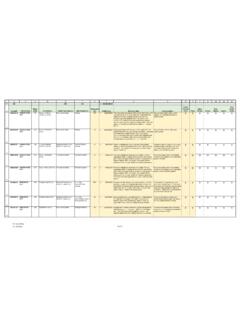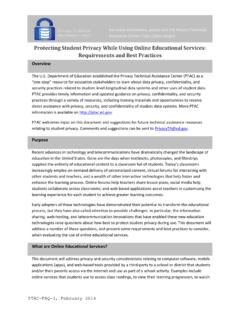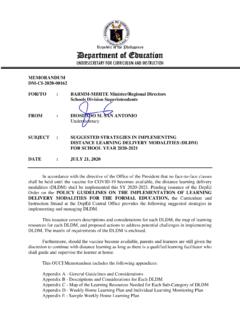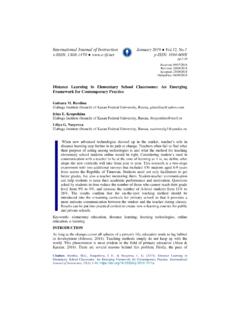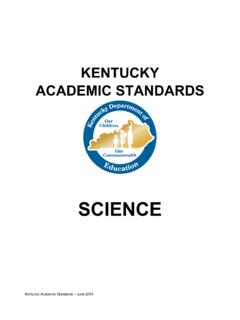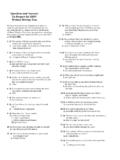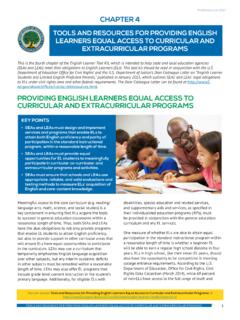Transcription of Understanding Public School Residency Requirements
1 Understanding Public School Residency Requirements A GUIDE FOR ADVOCATES A G U I D E F O R A D V O C A i Acknowledgments This manual was updated and revised for Education Law Center by Cindy Fine, Esq. Additional assistance in the preparation of this manual was provided by David Giles, Esq. and by Elizabeth Athos, Esq., senior attorney at Education Law Center. About the Education Law Center Founded in 1973, the Education Law Center (ELC) serves as the leading voice for New Jersey s Public School children and has become one of the most effective advocates for equal educational opportunity and education justice in the United States. Widely recognized for groundbreaking court rulings on behalf of at-risk students, ELC also promotes educational equity through coalition building, litigation support, policy development, communications, and action-focused research in New Jersey, in other states, and at the federal level.
2 ELC s legal and policy advocacy, which includes such landmark rulings such as Abbott v. Burke, has significantly advanced the provision of fair School funding, high quality early education, safe and adequate School facilities, and School reform, especially to schools serving high concentrations of at-risk students and students with disabilities and other special needs. These successes have, in turn, resulted in strong academic gains and progress in closing student achievement gaps in New Jersey. Disclaimer The information provided in this guide helps explain the laws affecting the rights of students in School Residency cases in New Jersey, but should not be construed as legal advice.
3 This manual is provided for educational and informational purposes only, and contains general information that may not reflect current or complete legal developments. Readers are encouraged to seek appropriate legal advice from a licensed attorney on the particular facts and circumstances of their case. 2019 Education Law Center ii Table of Contents Page Introduction 1 Section 1 -- When is a Student Entitled to Enroll in a District s 1 Public Schools? Overview of Residency Rules 1 Section 2 -- School Enrollment Based on Domicile of Parent or 3 Guardian General Rule 3 Establishing Domicile and Moving to or From a School District 3 Adult or Emancipated Students - Student s Own 5 Domicile Governs Housing Status Irrelevant to Eligibility 6 Immigration Status Irrelevant to Eligibility 6 Parent or Guardian Living in Temporary Residence 7 Children of Divorced or Separated Parents 8 Students Residing with Guardian or with Person Applying for Guardianship 12 Section 3 -- Special Rules for Students Experiencing Family or Economic 15 Hardship.
4 Family Crisis or Homelessness Family or Economic Hardship: Affidavit Student Rules 16 Family Crisis Rules 24 Homelessness Rules 26 iii Section 4 -- School Stability Rules for Students in Out-of-Home 29 Placements Students Placed in Resource Family Homes 29 Students Placed in Group Homes and Other Group Settings 32 Section 5 -- Other Special Residency Rules 34 Special Rules for Military Families 34 Residence within Two or More School Districts 37 Section 6 Other School Options Outside the District of Residence 37 Section 7-- Procedural Rules and Protections Governing School 38 Enrollment and Residency Disputes Applications for Enrollment in a
5 School District 39 Initial Determinations of Eligibility or Ineligibility 41 Notices of Ineligibility 43 Procedures and Protections for Currently Enrolled Students 44 Appeals to the Commissioner of Education 46 Tuition Assessments for Ineligible Attendance 48 Endnotes 50 Appendix 78 1 Introduction Parents, guardians, caregivers and School administrators will sometimes disagree over whether a student may enroll in or continue to attend a Public School based on his or her place of residence. The information in this manual is designed to help parents, guardians and caregivers understand New Jersey s Public School Residency rules and to inform them of their legal rights.
6 While School districts make the initial determinations regarding a student s right to attend a given School , regulations adopted by the New Jersey Department of Education (NJDOE) provide extensive procedural protections to ensure that students are not denied enrollment without the opportunity for a fair hearing and that a student s education is not disrupted pending resolution of a Residency dispute. Section 1 -- When is a Student Entitled to Enroll in a District s Public Schools? Overview of Residency Rules: New Jersey law contains detailed rules specifying the categories of age-eligible1 students entitled to a free Public education within a given School district.
7 The most widely-applicable, general rule is that a student may attend the School district in which his or her parent or guardian is domiciled. 2 Domicile refers to one s permanent residence. While the School district in which a student may enroll is generally governed by the parent or guardian s domicile, another rule permits students to attend School in a district in which the parent or guardian temporarily resides, so long as such temporary residence has not been established solely for purposes of the student attending the School district of temporary residence. 3 For a student whose parents are divorced or separated and living in different School districts, the district in which the student may attend School may be determined by written agreement or court order; absent such an agreement or order, default rules contained in the regulations determine student domicile.
8 2 Special rules apply to students encountering various conditions of hardship, students in foster care, and students experiencing homelessness or family crisis. These rules permit attendance in a given School district by students (1) who are living in the home of someone domiciled in the district, other than the parent or legal guardian, due to family or economic hardship provided certain Requirements are met,4 (2) who are living outside the School district due to certain categories of family crisis, 5 (3) whose families have relocated outside the School district as a result of becoming homeless (as the term is defined in special rules governing the education rights of homeless students)6 or (4)
9 Who have been residentially placed by the Division of Child Protection and Permanency outside the School district but who attended School in the district prior to such Similarly, special provisions allow students to continue to attend School in a given School district when they have relocated by reason of having a parent or guardian ordered into active military service during war or national emergency. 8 The regulations further include special rules governing students who reside on federal property9 or whose residence falls within two different School It should be noted that students with disabilities may attend a Public or private School in a different School district -- at the expense of their home School district -- if their Individualized Education Program (IEP) provides for such out-of-district placement.
10 Issues regarding the placement of students with disabilities are discussed in ELC s Publication, The Right to Special Education in New Certain students may receive their education on-site at various residential facilities (or in juvenile detention facilities), circumstances noted in Section 4 of this publication. Other circumstances in which students may attend School outside their home School district include: enrollment in a different School district under New Jersey s Interdistrict Public School Choice Program; admission to charter schools or vocational-technical schools outside the district; attendance in an adjoining School district for students living remote from the School in their district;12 and high School attendance in a different district because the home district lacks high School School districts may also admit nonresident students, with or without payment of tuition, in their discretion.

